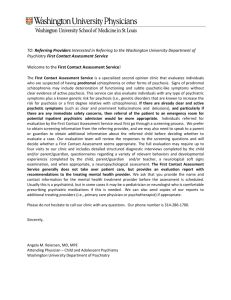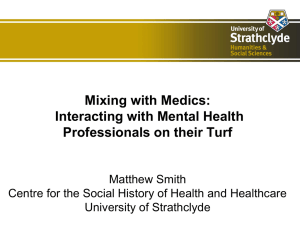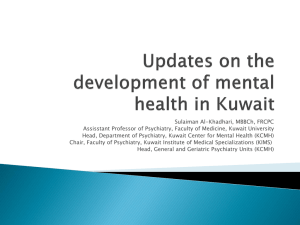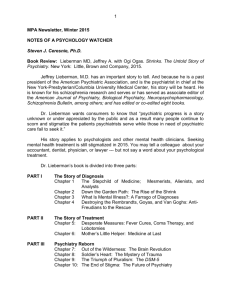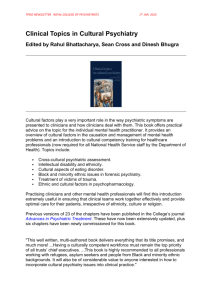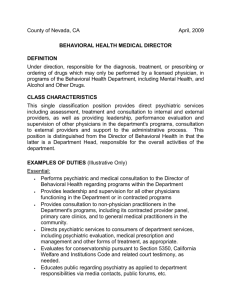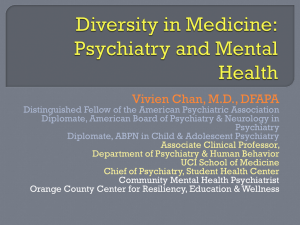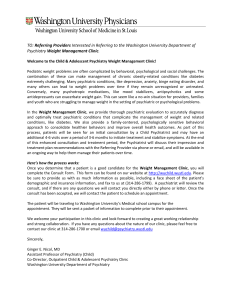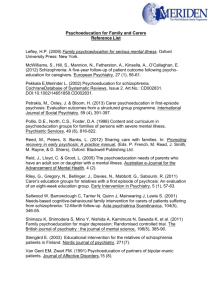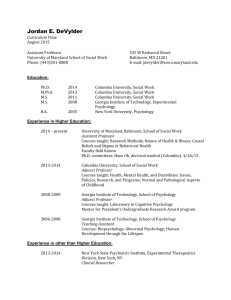Presentation Description
advertisement
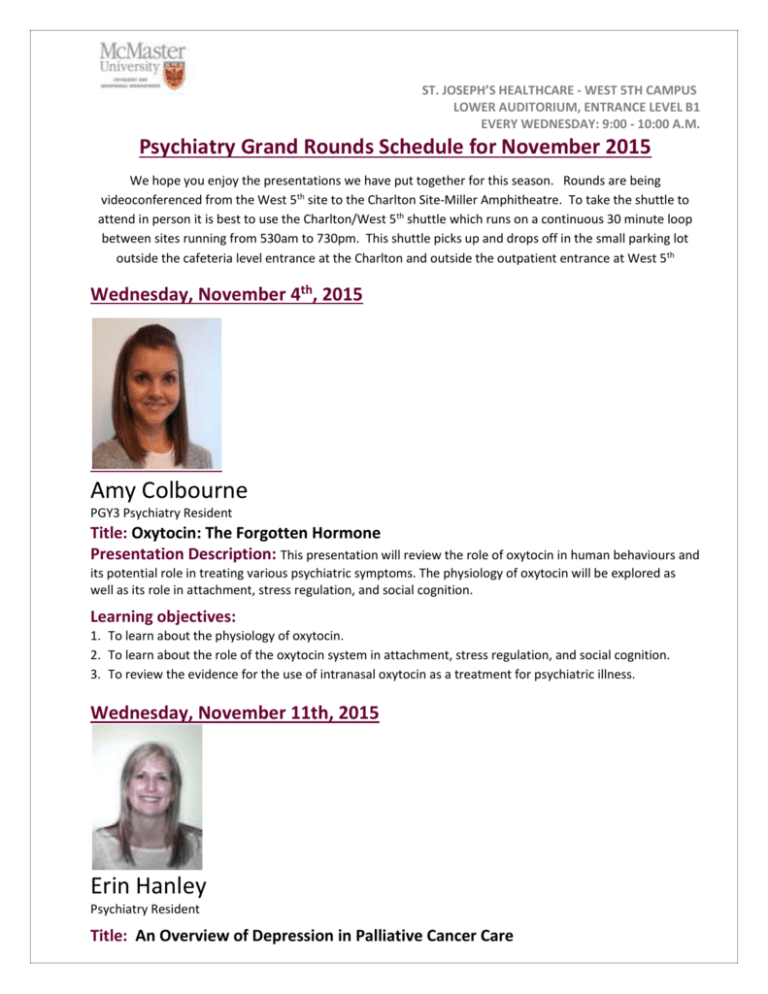
ST. JOSEPH’S HEALTHCARE - WEST 5TH CAMPUS LOWER AUDITORIUM, ENTRANCE LEVEL B1 EVERY WEDNESDAY: 9:00 - 10:00 A.M. Psychiatry Grand Rounds Schedule for November 2015 We hope you enjoy the presentations we have put together for this season. Rounds are being videoconferenced from the West 5th site to the Charlton Site-Miller Amphitheatre. To take the shuttle to attend in person it is best to use the Charlton/West 5th shuttle which runs on a continuous 30 minute loop between sites running from 530am to 730pm. This shuttle picks up and drops off in the small parking lot outside the cafeteria level entrance at the Charlton and outside the outpatient entrance at West 5th Wednesday, November 4th, 2015 Amy Colbourne PGY3 Psychiatry Resident Title: Oxytocin: The Forgotten Hormone Presentation Description: This presentation will review the role of oxytocin in human behaviours and its potential role in treating various psychiatric symptoms. The physiology of oxytocin will be explored as well as its role in attachment, stress regulation, and social cognition. Learning objectives: 1. To learn about the physiology of oxytocin. 2. To learn about the role of the oxytocin system in attachment, stress regulation, and social cognition. 3. To review the evidence for the use of intranasal oxytocin as a treatment for psychiatric illness. Wednesday, November 11th, 2015 Erin Hanley Psychiatry Resident Title: An Overview of Depression in Palliative Cancer Care Presentation Description: Cancer is on the rise. With medical advances in cancer diagnosis and treatment, people are living longer with advanced stages of the disease. The psychological and psychiatric sequelae of cancer are highly prevalent, diverse and challenging, with depression being associated with a number of significant health outcomes that impact patients’ quality of life. The role of mental health professionals is expanding in this field to address these concerns and presents opportunities to contribute to the care of people facing life-threatening illness. Learning objectives: 1. 2. 3. 4. Consider psychiatry's role in palliative care Review the challenges in diagnosing depression in patients with advanced cancer Review the desire for hastened death and its contributing factors in advanced cancer patients Consider the unique treatment needs of advanced cancer patients and review the evidence for pharmacological and psychotherapeutic interventions with an emphasis on novel treatment modalities 5. Consider the relevance and future directions Wednesday, November 18th, 2015 Roberto Sassi Associate Professor, Psychiatry & Behavioural Neurosciences Dr. Sassi is an Associate Professor in the Department of Psychiatry & Behavioural Neurosciences and an attending psychiatrist at the Child Psychiatry department and at the Mood Disorders Outpatient Program, St. Joseph’s Healthcare Hamilton. His medical training was completed in Sao Paulo, Brazil, followed by residencies in adult psychiatry in Sao Paulo and in both adult and child & adolescent psychiatry at Harvard University. Dr. Sassi also completed a postdoctoral fellowship in neuroimaging at the Western Psychiatric Institute and Clinic in Pittsburgh, working on magnetic resonance imaging (MRI) investigations on bipolar disorder. Dr. Sassi’s research interests include: understanding the neurobiological mechanisms of mood disorders in children and adolescents and possible early interventions in these populations; the effects of physical activity in patients struggling with mood disorders; and the multigenerational transmission of risk for psychopathology. Title: The Very Early Origins of Mood Disorders Presentation Description: Major mood and anxiety disorders often begin early in life. Many biological and psychological risk factors have been identified, but understanding the complex interactions among these genetic, psychological and environmental variables is challenging. We will review some of the risk pathways and developmental trajectories in childhood psychopathology, including data from our MAVAN longitudinal study, and briefly review the implications for intervention. Learning objectives: 1. Brief overview of genetic, temperamental and environmental risk factors for mood disorders. 2. Review preliminary data on children within the MAVAN study. 3. Brief review of potential interventions to prevent the development of major mental illnesses. Wednesday, November 25th, 2015 Robert Zipursky Professor, Department of Psychiatry & Behavioural Neurosciences Dr. Zipursky is Professor of Psychiatry and Behavioral Neurosciences at McMaster University in Hamilton, Ontario, Canada. He completed his medical training at McMaster University followed by residency training in psychiatry at the University of Pittsburgh and research fellowship training in the area of structural brain imaging at Stanford University. Before moving to McMaster University in 2007, Dr. Zipursky was Professor and Tapscott Chair in Schizophrenia Studies at the University of Toronto. Dr. Zipursky’s research has focused on characterizing the structural brain abnormalities associated with schizophrenia, defining optimal pharmacologic treatment for the first episode of schizophrenia, and understanding the determinants of outcome from schizophrenia. He is the recipient of the John Cleghorn Memorial Award for Excellence and Leadership in Clinical Research from the Canadian Psychiatric Association, and the Kempf Fund Award for Research Development in Psychobiological Psychiatry from the American Psychiatric Association. Title: What’s DUP got to do with it? Presentation Description: Schizophrenia is a highly treatable illness with the large majority of patients achieving remission of their psychotic symptoms following their first episode of psychosis. Rates of recovery, however, remain relatively low and underscore the challenge of returning to a full level of functioning in the community following a psychotic illness. There has been much interest in the possibility that longer periods of untreated psychosis (DUP) may limit the potential for improvement. This presentation will address the question of whether DUP should be understood as a modifiable determinant of treatment response and recovery. Learning objectives: 1. To distinguish between DUP as a determinant versus a marker of outcome from schizophrenia. 2. To describe the magnitude of the association between DUP and outcomes from schizophrenia. 3. To summarize what is known about the relationship between DUP and both cognitive and structural brain findings in schizophrenia.
